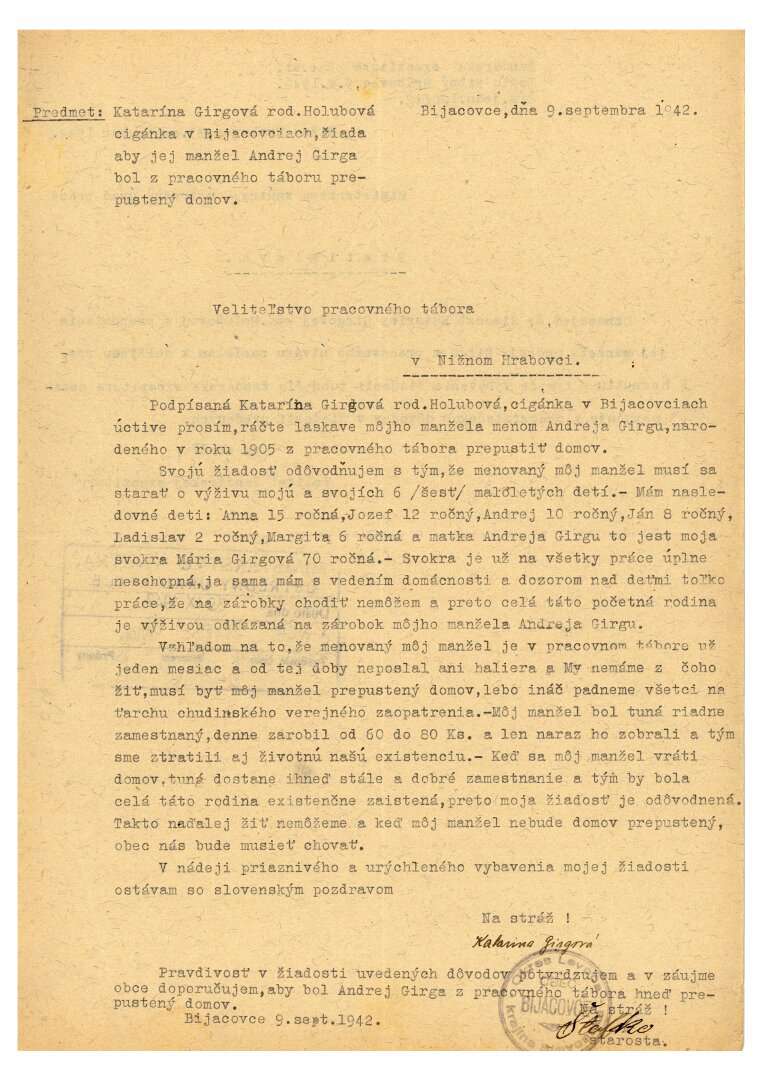Bijacovce, dňa 9. septembra 1942.
Predmet:
Katarína Girgová rod. Holubová
cigánka v Bijacovciach, žiada
aby jej manžel Andrej Girga
bol z pracovného táboru pre-
pustený domov.
Veliteľstvo pracovného tábora
V Nižnom Hrabovci.
Podpísaná Katarína Girgová rod. Holubová, cikánka v Bijacovciach
úctive prosím, ráčte laskave môjho manžela menom Andreja Girgu, naro-
deného v roku 1905 z pracovného tábora prepustiť domov.
Svoju žiadosť odôvodňujem s tým, že menovaný můj manžel musí sa
starať o výživu mojú a svojích 6 /šesť/ maloletých detí.- Mám nasle-
dovné deti: Anna 15 ročná, Jozef 12 ročný, Andrej 10 ročný, Ján 8 ročný,
Ladislav 2 ročný, Margita 6 ročná a matka Andreja Girgu tj. moja
svokra Mária Girgová 70 ročná.- Svokra je už na všetky práce úplne
neschopná, ja sama mám s vedením domácnosti a dozorom nad dětmi toľko
práce, že na zárobky chodiť nemôžem a preto celá táto početná rodina
je výživou odkázaná na zárobok môjho manžela Andreja Girgu.
Vzhľadom na to, že menovaný môj manžel je v pracovnom tábore už
jeden mesiac a od tej doby neposlal ani haliera a My nemáme z čoho
žiť, musí byť môj manžel prepustený domov, lebo ináč padneme všetci na
ťarchu chudinského veřejného zaopatrenia.-Môj manžel bol tuná riadne
zamestnaný, denne zarobil od 60 do 80 Ks. A len naraz ho zobrali a tým
sme ztratili aj životnú našú existenciu.- Keď sa môj manžel vráti
domov, tuná dostane ihned stále a dobré zamestnanie a tým by bola
celá táto rodina existenčne zaistená, preto moja žiadosť je odôvodnená.
Takto naďalej žiť nemôžeme a keď môj manžel nebude domov prepustený,
obec nás bude musieť chovať.
V nádeji priaznivého a urychleného vybavenia mojej žiadosti
ostávam so slovenským pozdravom
Na stráž!
Katarina Girgová
Pravdivosť v žiadosti uvedených dôvodov potvrdzujem a v záujme
obce doporučujem, aby bol Andrej Girga z pracovného tábora hneď pre-
pustený domov.
Bijacovce 9. sept. 1942.
Na stráž!







